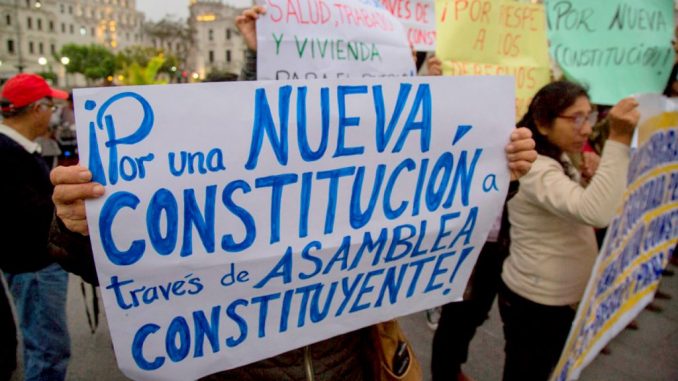
By Tiberio Villacreces and Alberto Giovanelli
In the midst of coup threats, vacancy requests and an institutional crisis that continues to intensify, Castillo’s government is moving further away from one of the fundamental objectives for which it was elected: to throw the anti-democratic Fujimori constitution of 1993 into the dustbin of history.
From the government’s own offices, we find more and more excuses based on his move towards the center and the supposed objective of obtaining consensus in order to try “not to irritate the right wing”.
Unfortunately, these same arguments are outlined by the majority sectors of the “New Peru” itself. History has given us numerous examples in our country and throughout Latin America, every time these “consensuses” have been pursued, they are impossible to reach, and the right wing ends up demanding unconditional surrender.
Thus, for example, from Congress, Fujimorism and its allies are now promoting a modification to the Law of Rights and Citizen Participation, proposing that any constitutional reform must be previously approved by Congress before being submitted to a referendum.
This is the expected answer to “the search for consensus”. Now then, why do we revolutionary socialists make the fight for the Free and Sovereign Constituent Assembly a fundamental axis of our daily activity? Why do we understand that there are no possible changes in favor of the great majorities within the framework of the Constitution of 1993? And it is also legitimate to ask ourselves, can this regime and these parties grant the great majorities the democratic possibility of defining their destiny freely? Can we “agree” with them the possibility of expressing without limits the popular aspirations in a truly sovereign assembly?
It is very clear that these institutions in power, the political parties, parliament and business lobbies demonstrate every day that they are against the will that was pronounced in the ballot boxes and expressed in the streets.
You may be interested in: Peru: Government Palace is a castle with an invisible president
The current Fujimorist Constitution limits the decisions for the benefit of the constituted powers. Not only does it declare the inviolability of private property, alienates our natural wealth in favor of imperialist companies that prey on the environment and the land, but it also protects them by giving constitutional status to the maintenance of banking secrecy and makes it absolutely clear that any declaration of legal equality will be purely formal and without practical effectiveness.
Eliminating these anti-democratic barriers would mean ending the limits for the vast majority of the population to decide what to “do and undo” over and above any institutionality consecrated by the constituted power.
To implement, for example, the electivity of judges and the revocability of public offices; to take the measure that no civil servant earns more than a teacher to eliminate the political caste that governs for the capitalists; to grant the right to vote for those over 14 years of age and the right to run for elections to any collective of people; debate on the persecution of minorities, the right to legal abortion and the fight against the feminicide pandemic, end the current retirement system, nationalize the mines, the banks and the main resources of the country, re-debate the ownership of the countryside, plan the economy, stop paying the foreign debt etc. etc. would be aspects to be debated in a free and sovereign constituent assembly.
At this point a question is unavoidable: is it possible to overcome the limits that are being imposed on the current constitutional process, bearing in mind that the capitalist class always seeks to protect its properties, its power and its privileges? How to advance to a true free and sovereign constituent assembly?
A sovereign constituent assembly is conquered in the streets
We also reaffirm that contrary to what the Castillo government is trying to do, it is not negotiation, it is not deals, it is not consensus that will lead to the imposition of a free and sovereign constituent assembly. For decades the factors of power have configured a deeply reactionary and anti-popular neoliberal pattern of accumulation that they are not willing to abandon.
Multiplying all the energy deployed in the streets by the youth, peasants and sectors of workers, will be the only guarantee of imposing the will of the people. Hence, the discussion about which road to take to deepen the mobilization and thus defend the rights of the great majorities cannot be postponed.
To advance on this path, in the defense of the central slogan that brought Castillo to the government, it is indispensable to achieve the broadest unity of action among all of us who oppose the “institutional” coups of the right wing and who are also in favor of the government fulfilling the program for which it was elected. For this we must develop action plans and promote, for example, committees or coordinators in different sectors, in the neighborhoods, the lands, among the youth, in the workplaces. The anti-capitalist left should also prioritize as a necessity the setting up of new organizations for the fight, more democratic and united.
In this way we will be able to advance in a revolutionary socialist political project, a pole that attracts the militant youth, the poor peasants, the workers and also the women who suffer from capitalist patriarchal oppression. To overthrow the Fujimori constitution is possible, to impose our program is possible, we will be able to prevent the institutional coups disguised as vacancy.
Unity and mobilization show us the road we must take.








